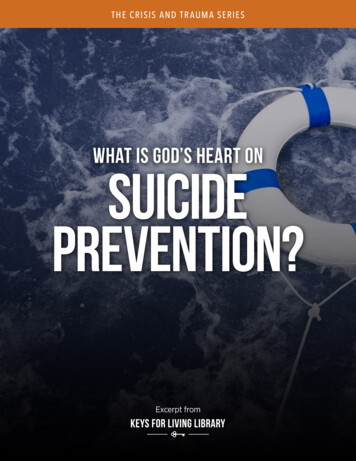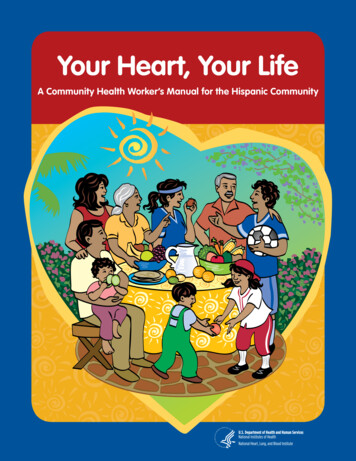
Transcription
T HE CRISIS A ND T R AUM A SERIE SWhat Is God’s Heart onSuicidePrevention?Excerpt from
Suicide PreventionHope When Life Seems HopelessNOTE: If you are having suicidal thoughts and intend to harm yourself,call 911 immediately. You can also call or text one of the following suicideprevention hotlines anytime. These free, confidential services are available24/7 and exist to help and support you. Remember, you’re not alone. Help isavailable—and there is hope.Call 1-800-273-8255(National Suicide Prevention Lifeline)Text 741741(Crisis Text Line)What Is God’s Heart on Suicide Prevention?If you struggle with suicidal thoughts . . . if you feel trapped in a storm and see no hope for a brighter tomorrow. . . know that God is extending you a lifeline of hope. He loves you. He cares about you. He wants to help you—and other people will too.Remember, God is full of grace and compassion for you.“The Lord is gracious and righteous;our God is full of compassion. . . .when I was brought low, he saved me.”(Psalm 116:5–6)God wants you to know it’s never too late to find hope.“Anyone who is among the living has hope” (Ecclesiastes 9:4).God wants you to know there is hope for you.“There is surely a future hope for you, and your hope will not be cut off”(P roverbs 23:18).God wants you to know He is with you and can help you get throughdifficult times.“So do not fear, for I am with you; do not be dismayed, for I am your God. Iwill strengthen you and help you; I will uphold you with my righteous righthand” (Isaiah 41:10).“If you struggle withsuicidal thoughts . . .know that Godis extending you alifeline of hope.”
God wants you to know you are loved and valued.“You are precious to me. You are honored, and I love you” (Isaiah 43:4 nlt).God wants you to know you have purpose.“The Lord will fulfill his purpose for me; your steadfast love, O Lord, endures forever. Do not forsake the work ofyour hands” (Psalm 138:8 esv).God wants you to know your pain and suffering are not meaningless.“We were crushed and overwhelmed beyond our ability to endure, and we thought we would never live through it.In fact, we expected to die. But as a result, we stopped relying on ourselves and learned to rely only on God, whoraises the dead” (2 Corinthians 1:8–9 nlt).God wants you to talk to someone and find help if you’re having suicidal thoughts.“In an abundance of counselors there is safety” (P roverbs 11:14 esv).God wants you to come to Him for refuge and help.“The Lord is a shelter . . . a refuge in times of trouble” (Psalm 9:9 nlt).God wants you to know He will not reject you when you come to Him.“Whoever comes to me [Jesus] I will never drive away” (John 6:37).God wants you to know He can heal your broken heart and the painful wounds of your past.“He heals the brokenhearted and binds up their wounds” (Psalm 147:3).God wants you to receive His free gift of salvation.“For God so loved the world that he gave his one and only Son, that whoever believes in him shall not perish buthave eternal life” (John 3:16).God wants you to have hope and rest in safety and security.“You will be secure, because there is hope; you will look about you and take your rest in safety” (Job 11:18).Key Verse to Memorize“There is surely a future hope for youand your hope will not be cut off.”(Proverbs 23:18)Key Passage to ReadLamentations 3:19–26
My Personalized PlanWhen I feel hopeless and suicidal thoughts occur, it’s important to have a plan to find immediate help andongoing support. I will remember that I am not alone. The Lord promises to be with me, to guide me, and towatch over me. . . .“I will instruct you and teach youin the way you should go;I will counsel you with myloving eye on you.”(Psalm 32:8)When I’m in despair and struggling with suicidal thoughts, I will Talk to someone— I will reach out to a friend, family member, pastor, counselor, or someone I trust and honestly tell themwhat I’m thinking about doing.— I will call the National Suicide Prevention Lifeline at 1-800-273-8255, text the Crisis Text Line at741741, or call 911 when I’m in danger of harming myself.“In an abundance of counselors there is safety” (P roverbs 11:14 esv).Seek to be safe— I will remove any harmful or lethal objects from my possession/home—any guns, knives, ropes, drugs, pills,or other harmful objects that I am able to easily access.— I will identify the safe people and places I can go to when I’m struggling with thoughts of self-harm.“But as for me, it is good to be near God. I have made the Sovereign Lord my refuge” (Psalm 73:28).Hold on to hope— I will try to put things in perspective and remember that no matter what I’m feeling or thinking, I can havehope.— I will read God’s Word to find true, lasting hope and read stories of survivors to remind me hope is a solidanchor. (Note: You can find “Stories of Hope and Recovery” on the National Suicide Prevention Lifelinewebsite at www.suicidepreventionlifeline.org/stories.)“We have this hope as an anchor for the soul, firm and secure” (H ebrews 6:19).Address physical issues— I will get a medical check-up and talk with a doctor to see if any physical issues may be contributing to mysuicidal thoughts (or depression) and consider any recommended treatments to help me.— I will take care of myself physically and try to live a healthy lifestyle by eating well, getting adequate sleepeach night, exercising as I’m able, and avoiding harmful substances such as drugs and alcohol.“I discipline my body and keep it under control” (1 Corinthians 9:27 esv).Take care of my emotional needs— I will avoid unhealthy coping mechanisms such as drinking alcohol, using drugs, or self-harming behaviors.— I will consider new, healthy ways of managing my emotions such as talking with others, journaling, drawing/painting, praying, meditating, or exercising.“In my distress I called to the Lord; I cried to my God for help” (Psalm 18:6).
Replace negative thoughts— I will acknowledge negative thoughts and lies I believe about myself and my situation.— I will replace negative thoughts by meditating on the truth of God’s Word.“Whatever is true, whatever is noble, whatever is right, whatever is pure, whatever is lovely, whatever is admirable—if anything is excellent or praiseworthy—think about such things” (P hilippians 4:8).Acknowledge that pain is temporary— I will put my pain in perspective and acknowledge that the pain I feel is temporary—it won’t last forever.— I will remember that God promises to one day put an end to all pain and suffering.“He will wipe every tear from their eyes, and there will be no more death or sorrow or crying or pain. All these thingsare gone forever” (R evelation 21:4 nlt).Be in community— I will remember I’m not alone—that many other people have been in my place and found help.— I will seek the support of others and consider joining a community support group, a local church, or otherhelpful groups.“Two people are better off than one, for they can help each other succeed. If one person falls, the other can reachout and help” (Ecclesiastes 4:9–10 nlt).Look to God for help— I will regularly pray and search God’s Word to find help, hope, strength, peace, and guidance.— I will remember that God loves me, cares about me, and that He is always with me.“The Lord is my rock, my fortress, and my savior; my God is my rock, in whom I find protection. He is my shield, thepower that saves me, and my place of safety” (Psalm 18:2 nlt).Stay connected— I will remember that even when I’m not in a crisis or having suicidal thoughts, it’s important to stayconnected with others.— I will regularly check in with others (counselor, doctor, pastor, trusted individual, etc.) to evaluate mysuicide risk and get help as needed.“Let us not neglect our meeting together, as some people do, but encourage one another” (H ebrews 10:25 nlt).
My Contract of HopeThe following is a solemn binding contract. This contract cannot be declared null and void without the writtenagreement of both parties.I promise that if I should consider harming myself, I will talk with you before I do anything destructive.I sign my name as a pledge of my integrity.SignatureDateSignatureDate“Anyone who is among the living has hope.”(Ecclesiastes 9:4)What Are Some Misconceptions about Suicide?Misconceptions abound on the topic of suicide. There are many common myths about suicidal behavior . . . whyit happens, when it happens, who is at risk, and what can be done about it. There are also misconceptions aboutsuicide and faith. We need discernment to determine facts from myths, truth from falsehood, so we can rightlyand wisely respond to suicidal behavior.“Give discernment to me, your servant.”(Psalm 119:125 nlt)12 Common Misconceptions about SuicideMisconception #1: “People who talk about suicide won’t really do it.”Truth: An estimated 80% of people who die by suicide gave clues or warnings to friends or family. Therefore,you must take any threat of suicide seriously. Someone who talks about suicide gives others the opportunity tointervene.Misconception #2: “You should never talk about suicide with depressed people—it could give them ideas.”Truth: Talking about suicide doesn’t create suicidal thoughts. For a struggler, having someone to talk with canbe a powerful preventative. Asking direct questions and discussing suicide is one of the most helpful thingsyou can do to prevent suicide.Misconception #3: “Everyone who dies by suicide is mentally ill.”Truth: No, not everyone. Roughly 90% who die by suicide are afflicted with a diagnosable psychiatric disorder.However, suicide can occur for reasons unrelated to mental illness. External factors such as the loss of a lovedone, job loss, divorce, or physical factors such as chronic illness can increase the risk of suicidal behavior.
Misconception #4: “People who are depressed are suicidal.”Truth: People can be depressed without having suicidal thoughts. Having depression does not automaticallymean someone is suicidal. And yet, people who are depressed are at a higher risk of suicide.Misconception #5: “More suicides occur during the winter holidays.”Truth: This is a long-standing myth. The opposite is actually true. Suicide rates peak in the spring and summer,and the rates are lower in the winter months.Misconception #6: “Suicide only affects specific groups of people.”Truth: While certain demographics show higher rates of suicide, people of all backgrounds, ages, ethnicities,and socioeconomic levels attempt and/or die by suicide each year.Misconception #7: “Most suicides happen suddenly without warning.”Truth: The majority of those who die by suicide give some hint, clue, or warning. That’s why it’s important toknow the warning signs of suicide and always take any suicidal thoughts, statements, or behaviors seriously.Misconception #8: “Suicide is genetic.”Truth: No one is destined to die by suicide. Just because one or more family members die by suicide doesn’tmean that other family members will do the same. However, those who have lost family members to suicide areat an increased risk for suicidal behavior.Misconception #9: “Talking about the method of someone’s suicide with all the details and the emotionalimpact on loved ones will help prevent others from attempting suicide.”Truth: Presenting precise details of a suicide can lead to copycat suicides. People in the media and school officialshave learned that suicide can be contagious, so to speak. Therefore, they curtail details of what happened andinstead focus on why it happened and what can be done to prevent further suicides.Misconception #10: “If someone is determined to die, nothing can be done to prevent a suicide.”Truth: Many people who struggle with suicidal thoughts, even the most severe strugglers, still have a desireto live. They often just want the pain to stop. There is always help and hope for every person who has suicidalthoughts. Suicide can be prevented.Misconception #11: “Once someone is suicidal, they will always be suicidal and unable to face difficulties.”Truth: In the context of a person’s entire life, a true suicidal crisis usually lasts only a brief time. Strugglingwith suicidal thoughts is temporary; it does not last a lifetime. Many people find help, get answers, and learnhow to handle the issues that underlie suicidal thoughts and behaviors.Misconception #12: “When a suicide crisis is over and the person has improved, there is no longer a risk forsuicide.”Truth: The time following a suicidal crisis is critical as many suicide deaths occur within a few months after theinitial crisis. Even when people improve and find help, regular, ongoing follow-up and evaluation is needed andbeneficial.
Misconceptions about Suicide and FaithMisconception #1: “A deeply committed believer would never consider suicide.”Truth: Sincere believers can and do struggle with suicidal thoughts, and tragically, some die by suicide eachyear—even ministry leaders. Many pastors face tremendous stress and are at an increased risk for burnout,depression, and suicidal behavior. The godly prophet Jeremiah once lamented, “Cursed be the day I was born!”(Jeremiah 20:14). Job, the most righteous man of his day said in his suffering, “Let the day of my birth be erased,and the night I was conceived” (Job 3:3 nlt).Misconception #2: “Suicide is the unpardonable sin.”Truth: Nowhere in the Bible is suicide presented as the unpardonable sin. The unpardonable sin is theunwillingness to yield to the convicting work of the Holy Spirit—the refusal to receive salvation through JesusChrist. In other words, it is rejecting the very means of forgiveness—Jesus Christ.Misconception #3: “Christians who take their own lives lose their salvation.”Truth: No. According to the Word of God, once you have believed in and accepted Jesus Christ as your Lordand Savior, the Spirit of God is the promised guarantee that you will inherit heaven and live eternally in thepresence of God. The Bible says, “You also were included in Christ when you heard the message of truth, the gospelof your salvation. When you believed, you were marked in him with a seal, the promised Holy Spirit, who is a depositguaranteeing our inheritance until the redemption of those who are God’s possession” (Ephesians 1:13–14).In all matters, especially in matters of life and death, our thoughts and actions must be based on truth andthe reality that there is always hope.“Guide me in your truth and teach me,for you are God my Savior,and my hope is in you all day long.”(Psalm 25:5)What Are the Risk Factors of Suicide?Risk factors indicate the likelihood of suicidal behavior—not the cause of suicidal behavior. Having a particularrisk factor does not mean that a person is destined to become suicidal. The risk factors simply mean that thereis a greater likelihood of suicidal behavior if a person has one or more of these factors.“I am suffering and in pain.Rescue me, O God,by your saving power.”(Psalm 69:29 nlt)
Risk Factors of SuicidePersonal Factors— Depression, anxiety, a mental disorder, or substance abuse disorder— Prior suicide attempt(s)— History of trauma— Medical illness, including chronic pain— Feelings of hopelessness and/or being isolated— The belief that suicide is a legitimate or noble solution to a personal crisis or dilemmaFamilial Factors— Family history of suicide— Family history of a mental health disorder— Family history of an alcohol or drug abuse disorder— Family violence, including physical or sexual abuseSocial and Situational Factors— Stressful life event (job loss, financial problems, trouble at school, being bullied, loss of a loved one, end ofa relationship, war, trauma, isolation, etc.)— Difficulty getting access to health care (especially mental health and substance abuse treatment)— Lack of social support; isolation— Local clusters of suicide— Exposure to suicidal behavior of others (peers, relatives, etc.)— Recent release from jail or prison— Access to lethal means (firearms in the home; pills, etc.)Knowing these factors can help you determine when someone is at risk for suicide and take appropriateprecautions. The Bible says . . .“A prudent person foresees dangerand takes precautions.”(Proverbs 27:12)What Are the Warning Signs of Suicide?Warning signs of suicide are different than the risk factors of suicide. Risk factors of suicide indicate an increasedlikelihood of suicidal behavior. The warning signs of suicide, however, indicate an immediate danger of suicidalbehavior. Knowing these warning signs can help save a life.“Save me and rescue me . . . Turn your ear to listen to me, and set me free.”(Psalm 71:2 nlt)
Warning Signs of SuicideTalking about wanting to die or wanting to kill oneselfTalking about being a burden to othersBeing preoccupied with death, dying, or violenceBuying a gun, stockpiling pills, looking for a way to kill oneselfMaking a plan to kill oneself (searching online, etc.)Feeling empty, hopeless, or like there is no reason to liveFeeling trapped or in unbearable painIncreasing the use of alcohol or drugsActing anxious or agitated; behaving recklesslyDisplaying extreme mood swingsShowing rage or talking about seeking revengeSleeping too little or too muchWithdrawing from family or friends or feeling isolatedSaying good-bye to loved ones, putting affairs in order, giving away belongings.If you or someone you know is displaying any of these warning signs, seek help immediately. Call theNational Suicide Prevention Lifeline at 1-800-273-8255 or text the Crisis Text Line at 741741.“Rescue me . . . don’t let me sink any deeper!Save me . . . and pull me from these deep waters.”(Psalm 69:14 nlt)How to Assess Suicide RiskThe assessment questions below are based on the Columbia Protocol or the Columbia-Suicide Severity RatingScale (C-SSRS). This professional tool helps identify risk and prevent suicide. It is used in many settings:healthcare facilities, first responders (police and firefighters), military bases, colleges and schools, correctionalfacilities (prisons, jails), athletics and sports, support groups, employment settings, and more. Spouses andparents use it as well. It is an effective, evidence-based tool that has saved many lives.“Save me, O God.”(Psalm 69:1)
Suicide Assessment Questions1. In the past month, have you wished you were dead or wished you could go to sleep and not wake up?2. In the past month, have you actually had thoughts about killing yourself?3. In the past month, have you thought about how you might do this?4. In the past month, have you had any intention of acting on these thoughts of killing yourself (as opposedto having the thoughts but definitely not acting on them)?5. In the past month, have you started to work out or worked out the details of how to kill yourself? Do youintend to carry out this plan?6. In the past three months, have you done anything, started to do anything, or prepared to do anything toend your life? (Examples: collected pills, obtained a gun, gave away valuables, wrote a will or suicide note,held a gun but changed your mind, cut yourself, tried to hang yourself, etc.)If you answered Yes to any of these questions, you should seek a behavioral health referral and contact the crisisnumbers listed below.If you answered Yes to questions 4, 5, or 6—you are at high risk of suicide and should seekimmediate help:Call 911Call 1-800-273-8255 (National Suicide Prevention Lifeline)Text 741741 (Crisis Text Line)Go to the emergency roomNote: If you are with someone who answered Yes to any of these questions—especially questions4, 5, and 6—stay with them until they can be evaluated. Remove any potentially dangerousobjects if necessary. Get help immediately through one of the numbers listed on the previouspage.“The Lord helps them . . .He saves them, and theyfind shelter in him.”(Psalm 37:40 nlt)
How to Help Someone Struggling with Suicidal ThoughtsAt some point, God may use you to be a lifeline of hope to someone struggling with suicidal thoughts. God canuse you to encourage those in despair, comfort the downcast, and give hope to the hopeless.“But God, who comforts the downcast,comforted us by the coming of Titus.”(2 Corinthians 7:6)Learn the warning signs and risk factors. Review the risk factors and warning signs in this resource. Identifywhich warning signs and risk factors they may have.Assess risk. Use the Suicide Assessment Questions in this resource to help you determine the level of crisis andidentify appropriate next steps. Keep them safe. Remove any access to lethal means (guns, pills, etc.). Stay withthem in a crisis. Help them find a safe place to stay when they are in danger of harming themselves.Be present and available. Call, visit, and check in on them regularly. Invite them to join you in activities (goingfor a walk, running errands, etc.). Your presence and consistent encouragement can show them they are lovedand valued.Listen with compassion. Don’t feel like you have to say something to “fix it.” When Job’s friends saw hissuffering, the Bible says, “Then they sat on the ground with him for seven days and nights. No one said a word toJob, for they saw that his suffering was too great for words” (Job 2:13 nlt). Listen to their story and their feelings.Express concern and empathy. Acknowledge the reality of deep pain and suffering.Talk about suicide with the person. Contrary to common belief, talking about suicide does not plant the ideain someone’s head. Rather, it offers them an opportunity to express their thoughts, feelings, and reactions.Ask direct questions regarding the existence of a plan. Ask how, when, and where in order to gain valuableinformation to help prevent an attempt. Do not promise confidentiality if this is the case.Ask for a signed contract that obligates the suicidal person to talk with you or with someone else before takingharmful action. You could ask something like: “Will you promise that you will first call me if you are consideringharming/killing yourself?” Write the words out like a contract and then both of you sign and date it. (See the“My Contract of Hope” in this resource.)Suggest helpful activities that can serve as self-coping strategies when suicidal thoughts occur, such as:— Keeping a journal to write down their thoughts throughout the day.— Exercising, painting, or playing a game to distract them and take their mind off things.— Going out often with friends and family, even if they have to push themselves to do so.— Memorize encouraging passages from God’s Word such as Psalm 46:1, Psalm 145:8–9; Isaiah 41:10, Jeremiah29:11; 1 John 3:1.
Help them build a support system. Don’t think you (as a caring party) can “do it all.” Help them build a supportsystem of family, friends, church members, community support groups, suicide hotlines as well as a pastor and/or counselor. Assist them in gathering emergency contact names and numbers so they have a list of people andplaces to call when they need help.Know your limits. You may begin to feel stressed and overwhelmed when helping a person who is suicidal.Recognize when you need to refer the suicidal person to someone better equipped to care for them. Take careof yourself physically, emotionally, and spiritually. Ask others for help when needed.Encourage them to pursue professional help such as medical treatment and professional counseling. Helpthem find a local counselor or clinic. Keep a list of numbers you will need to call in case there is an emergency.Direct them to emergency services such as the National Suicide Prevention Lifeline at 1-800-273-8255, theCrisis Text Line at 741741, the police, or local emergency room.Follow up. Stay connected with them. Check in with them regularly in person or by phone or text. Ask how theyare doing and how you can help them.For someone struggling in the darkness, you can be a light of hope as you help, pray for, and provide support.“Help those in trouble.Then your light will shine outfrom the darkness,and the darkness around youwill be as bright as noon.”(Isaiah 58:10 nlt)Go DeeperKeys for Living BooksWant to learn more about this topic? Check out the Keys for Living Library todiscover biblical hope and practical help on this topic and many more. The Keys forLiving are designed to help you—and help you help others—overcome difficulties,grow in maturity, and move forward in life.hopefortheheart.org/keys
4 POINTS OF GOD’S PLANWhether you’re trying to make sense of your past, trying to overcome something in the present, or trying tomake changes for a better future, the Lord cares about you. He loves you. No matter what challenges you or yourloved ones are facing, no matter the pain or difficult feelings you may be experiencing, no matter what you’vedone or what’s been done to you, there is hope. And that hope is found in Jesus Christ.God has a plan for your life, and it begins with a personal relationship with Jesus. The most importantdecision you can ever make is whether you will accept His invitation. If you have never made that decision,these four simple truths can help you start your journey together with Him.“‘For I know the plans I have for you,’ declares the Lord,‘plans to prosper you and not to harm you,plans to give you hope and a future.’”(Jeremiah 29:11)God’s Purpose for You: SalvationWhat was God’s motivation in sending Jesus Christ to earth? To express His love for you by saving you! TheBible says, “God so loved the world that he gave his one and only Son, that whoever believes in him shall not perishbut have eternal life. For God did not send his Son into the world to condemn the world, but to save the world throughhim” (John 3:16–17).What was Jesus’ purpose in coming to earth? To forgive your sins, to empower you to have victory over sin,and to enable you to live a fulfilled life! Jesus said, “I have come that they may have life, and have it to the full”(John 10:10).The Problem: SinWhat exactly is sin? Sin is living independently of God’s standard—knowing what is wrong and doing itanyway—also knowing what is right and choosing not to do it. The apostle Paul said, “I know that nothing goodlives in me, that is, in my sinful nature. I want to do what is right, but I can’t. I want to do what is good, but I don’t. Idon’t want to do what is wrong, but I do it anyway” (Romans 7:18–19 nlt).What is the major consequence of sin? Spiritual death, eternal separation from God. The Bible says, “Youriniquities [sins] have separated you from your God” (Isaiah 59:2). Scripture also says, “The wages of sin is death,but the gift of God is eternal life in Christ Jesus our Lord” (Romans 6:23).God’s Provision for You: The SaviorCan anything remove the penalty for sin? Yes! Jesus died on the cross to personally pay the penalty for yoursins. The Bible says, “God demonstrates his own love for us in this: While we were still sinners, Christ died for us”(Romans 5:8).What is the solution to being separated from God? Belief in (entrusting your life to) Jesus Christ as theonly way to God the Father. Jesus said, “I am the way and the truth and the life. No one comes to the Father exceptthrough me” (John 14:6). The Bible says, “Believe in the Lord Jesus, and you will be saved . . .” (Acts 16:31).
Your Part: SurrenderGive Christ control of your life, entrusting yourself to Him. Jesus said, “Whoever wants to be my disciple mustdeny themselves and take up their cross and follow me. For whoever wants to save their life will lose it, but whoeverloses their life for me will find it. What good will it be for someone to gain the whole world, yet forfeit their soul?”(Matthew 16:24–26).Place your faith in (rely on) Jesus Christ as your personal Lord and Savior and reject your “good works” asa means of earning God’s approval. The Bible says, “It is by grace you have been saved, through faith—and this isnot from yourselves, it is the gift of God—not by works, so that no one can boast” (Ephesians 2:8–9).Has there been a time in your life when you know you’ve humbled your heart and received Jesus Christ asyour personal Lord and Savior—giving Him control of your life? You can tell God that you want to surrenderyour life to Christ in a simple, heartfelt prayer like this:“God, I want a real relationship with you.I admit that many times I’ve chosen to go my own way instead of your way.Please forgive me for my sins.Jesus, thank you for dying on the cross to pay the penalty for my sins.Come into my life to be my Lord and my Savior.Change me from the inside out and make methe person you created me to be.In your holy name I pray. Amen.”What Can You Now Expect?When you surrender your life to Christ, you receive the Holy Spirit who empowers you to live a life pleasingto God. The Bible says, “His divine power has given us everything we need for a godly life . . .” (2 Peter 1:3). Jesusassures those who believe with these words:“Truly I tell you, whoever hears my word and believes him who sent mehas eternal life and will not be judged but has crossed over from death to life.”(John 5:24)The information in this resource is intended as guidelines for healthy living. Please consult qualifiedmedical, legal, pastoral, and psychological professionals regarding individual concerns.Unless otherwise indicated, all Scripture quotations are taken from The Holy Bible, New InternationalVersion , NIV Copyright 1973, 1978, 1984, 2011 by Biblica, Inc. Used by permission. All rightsreserved worldwide.Scripture quotations marked (ESV) are taken from The ESV Bible (The Holy Bible, English StandardVersion ), copyright 2001 by Crossway, a publishing ministry of Good News Publishers. Used bypermission. All rights reserved.Scripture quotations marked (NKJV) are taken from the New King James Version . Copyright 1982 byThomas Nelson, Inc. Used by permission. All rights reserved.Scripture quotations marked (NLT) are taken from the Holy Bible, New Living Translation, copyright 1996, 2004, 2015 by Tyndale House Foundation. Used by permission of Tyndale House Publishers, Inc.,Carol Strea
God wants you to know He will not reject you when you come to Him. “Whoever comes to me [Jesus] I will never drive away” (John 6:37). God wants you to know He can heal your broken heart and the painful wounds of your past. “He heals the brokenhearted and binds up their wounds” (Psalm 147:3). God w











